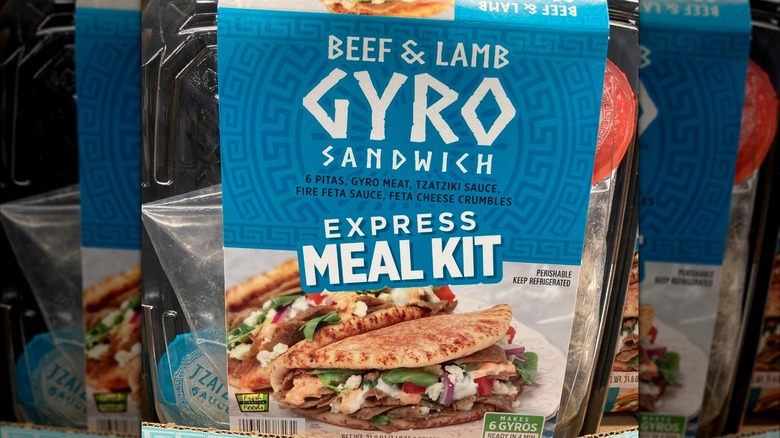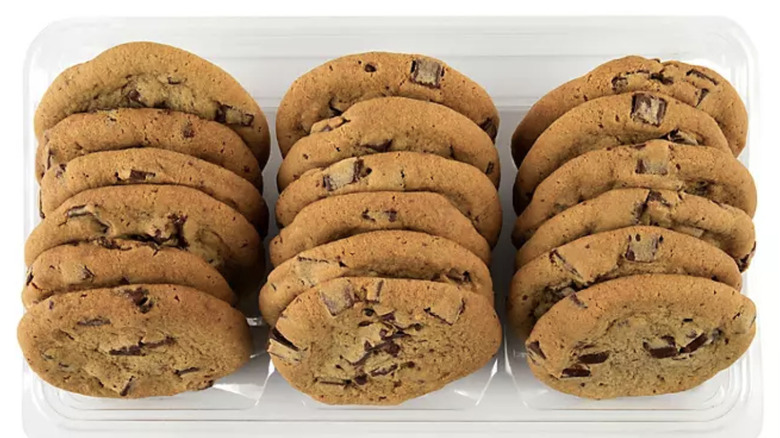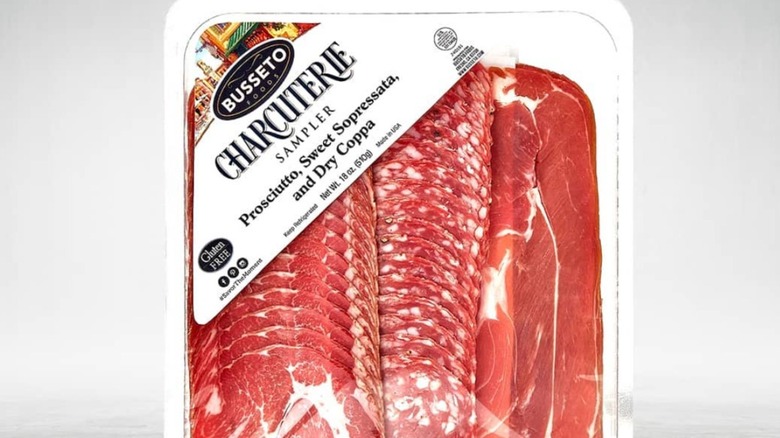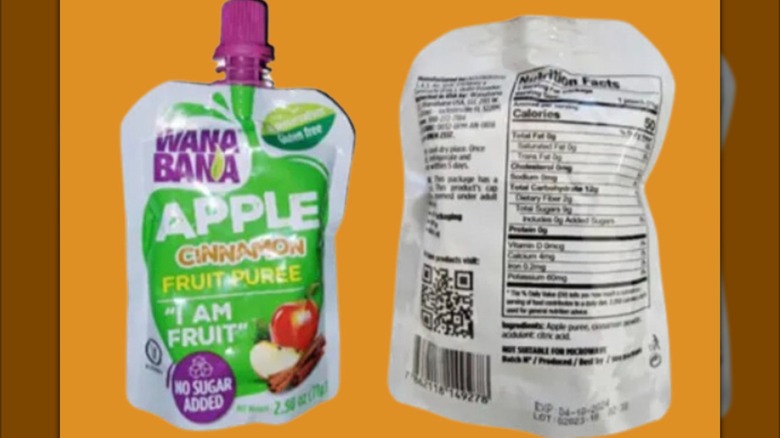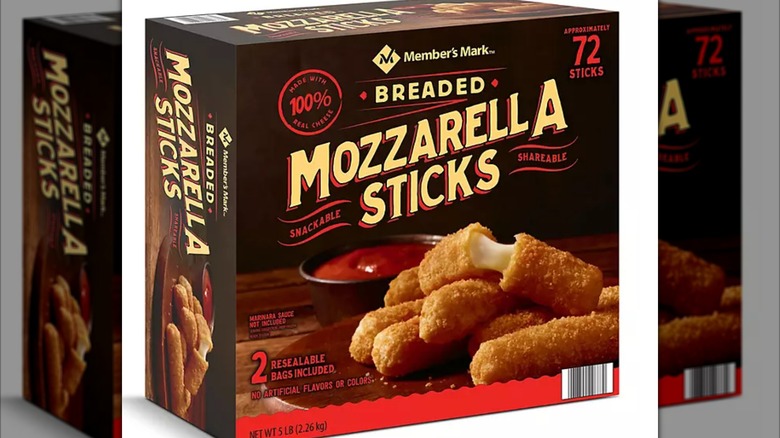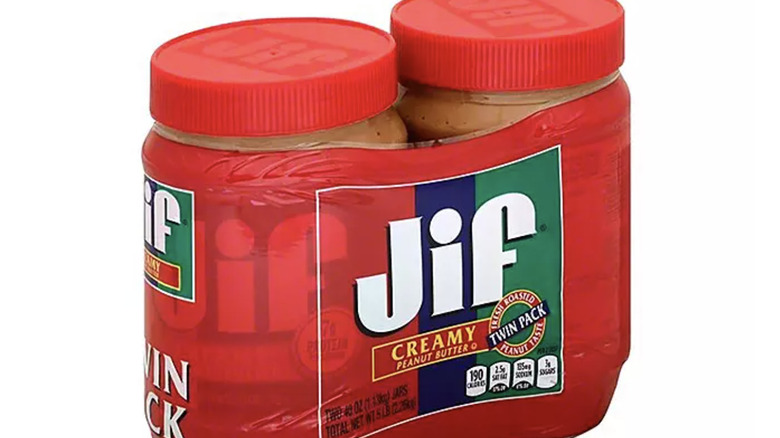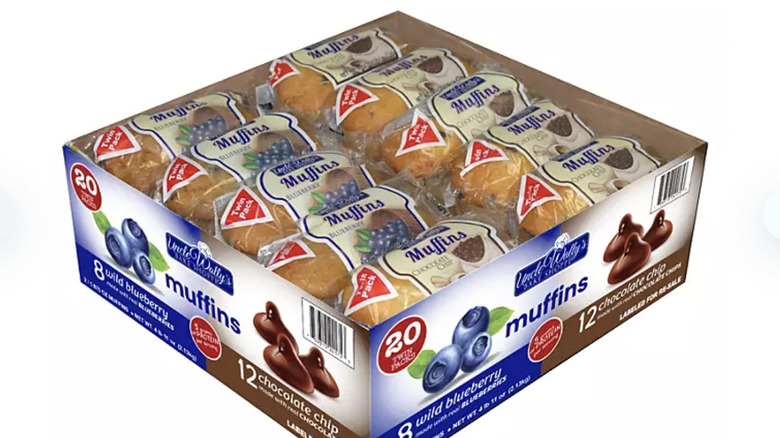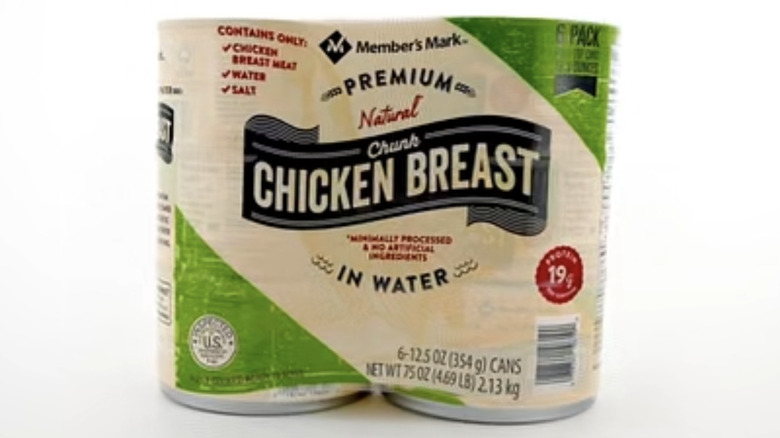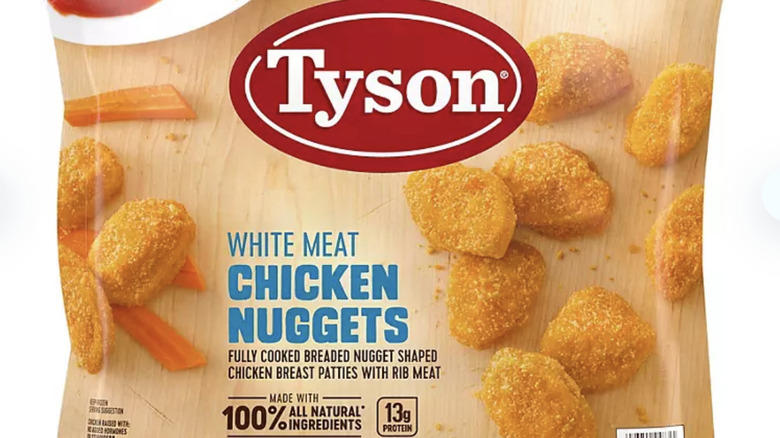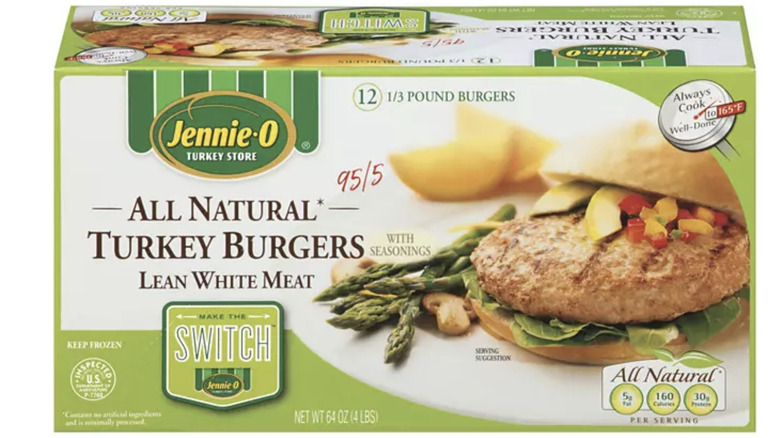Sam's Club Recalls That Affected Millions
Boasting close to 600 locations across the U.S., Sam's Club is a retail giant owned by Walmart that offers everything from fresh produce and bakery items to bags and backpacks. The retailer also sells seasonal products such as the Holidog — a hot dog topped with holiday leftovers. Unlike many other chain stores, Sam's Club works on a membership basis that sees shoppers pay an annual fee in exchange for access to bulk pricing and exclusive deals.
Despite its popularity and solid reputation in the retail world, Sam's Club isn't immune to logistical hiccups. Over the years, the wholesale chain has had to issue multiple product recalls that have either affected stores across the country or specific locations. From household staples like stone fruit and ham to desserts, the recalled products posed safety concerns due to bacterial contamination or the presence of foreign materials in the food.
Food recalls range in size and severity, with some affecting only a single batch of a product and others requiring nationwide attention. Interested in finding out about some of the biggest Sam's Club food recalls that have made headlines? Keep reading!
Chile chicken enchiladas (2025)
As revelers were recovering from New Year's celebrations, Sam's Club was gearing up to issue a recall of its Member's Mark Hatch Chile Chicken Enchiladas after the FDA flagged the product for possible contamination with Listeria monocytogenes. The members-only chain recalled thousands of boxes of the oven-ready enchiladas sold in stores nationwide.
The FDA gave the affected item the status of a Class II recall, meaning that the product could "cause temporary or medically reversible adverse health consequences or where the probability of serious adverse health consequences is remote." Listeria monocytogenes can indeed lead to serious health issues in young children, the elderly, pregnant women, and those with a compromised immune system. According to the USDA, Listeria causes approximately 1,600 cases of food poisoning and about 260 deaths in the U.S. each year. It remains unclear whether the Member's Mark Hatch Chile Chicken Enchiladas was responsible for any illnesses or fatalities.
Express meal kits (2024)
Meal kits are popular for several reasons. Not only are they quick to prepare, but they also minimize the hassle of meal planning and grocery shopping. Featuring pre-portioned ingredients and recipes, meal kits also make portion control relatively straightforward for those who care about their diets. Despite their ease-of-preparation, meal kits are not immune to the same safety issues that can affect other packaged foods.
In late 2024, Sam's Club pulled its Beef & Lamb Gyro Sandwich Express Meal Kits from the shelves nationwide due to concerns over contamination with Salmonella. The voluntary recall, which was initiated by Fresh Creative Foods, also affected the Gyro Family Kit sold at Sprouts Farmers Market. The offending ingredient was the tzatziki sauce included in the packaging, which was made with cucumbers linked to a nationwide Salmonella outbreak. People were right to be concerned — the Salmonella bacteria can lead to a range of symptoms including diarrhea, nausea, vomiting, abdominal pain, and loss of appetite.
Frozen cookie dough (2024)
Most of us can get quite excited about freshly baked cookies — especially when we can prepare them in the comfort of our own kitchens. Those who don't have the time to prepare cookies from scratch often opt for ready-to-bake store-bought cookie dough. However, sometimes things aren't as simple as they seem, as some dessert enthusiasts found out after the FDA recalled a range of Sam's Club frozen cookie dough in May 2024, upgrading the initiative to a Class II recall in June.
All in all, close to 30,000 cases of cookie dough were pulled off the shelves due to potential Salmonella contamination. The recalled products included Member's Mark Chocolate Chunk, Panera Chocolate Chipper Cookie, Rise Baking Jumbo Chocolate Chunk, and Mini Chocolate Chip Cookie. The contaminated products had been distributed in more than 20 states. The recall, which was issued by the Rise Baking Company, didn't just affect Sam's Club but also Costco and Panera Bread restaurants. The source of the contamination has not been disclosed.
Ready-to-eat charcuterie meat products (2024)
Charcuterie boards have become all the rage, and for a great reason. Perfect for entertaining guests, they offer both visual appeal and a spread of delicious cheeses, cured meats, fruit, nuts, and crackers. Unfortunately, sometimes one bad egg can spoil a gathering — which is precisely what happened when Fratelli Beretta USA recalled its Busseto Foods Charcuterie Sampler Prosciutto, Sweet Soppressata and Dry Coppa.
The plastic trays of ready-to-eat cured meats, which were sold at Sam's Club, were taken off the market after a sample of the product tested by the Minnesota Department of Agriculture came back positive for Salmonella. At the end of the day, more than 11,000 pounds of meat were recalled from Sam's Club locations in Ohio, Indiana, Illinois, Minnesota, North Carolina, Oklahoma, Georgia, and Texas. At the time, the recall of the Busseto Foods Charcuterie Sampler Prosciutto, Sweet Soppressata and Dry Coppa was suspected to be linked to an outbreak that left 24 people ill and five hospitalized.
Stone fruits (2023)
Also known as drupes, stone fruits consist of an inner stone, or hard seed, and a fleshy outer layer. In 2023, the fruit sold at Sam's Club hit the spotlight for all the wrong reasons when the retail store recalled its peaches, plums, and nectarines due to potential contamination. The recall affected both fruit sold individually and in plastic bags with labels displaying the code "USA-E-U." The stone fruits were also distributed to other retailers nationwide including Walmart, ALDI, Publix, Sprouts, and Albertsons.
The recall of the stone fruit was issued by HMC Marketing Group Inc., which sourced the produce from California-based HMC Farms. The move was taken after the company was alerted that the fruit could be contaminated with Listeria monocytogenes, a bacteria that can cause health issues such as diarrhea, stomach pain, and high fever. While the fruit was already past its sell-by date when the recall was announced, there was concern that some consumers may have kept it frozen to use at a later date. The contamination sickened people across seven states, many of whom required hospitalization, and resulted in at least one fatality.
Fruit purée (2023)
Normally designed for babies and toddlers, fruit purée consists of blended fruit packaged in squeezable plastic pouches. In 2023, many parents rushed to check their pantries when the FDA announced a recall of pouches of WanaBana Apple Cinnamon Fruit Purée due to concerns over high levels of lead in the product. The pouches were sold nationwide at various retail points, including Sam's Club, Dollar Tree, and Amazon.
The health scare was sparked after the North Carolina Department of Health and Human Services found that the product was the cause of elevated blood lead levels in four children. In fact, the pouches contained "extremely high levels of lead contamination," which were sufficient to cause acute lead toxicity in children, a serious medical condition marked by symptoms like muscle weakness, headache, hallucinations, and seizures.
The FDA reported that the product was potentially linked to at least 90 confirmed complaints of "adverse events." However, since there is a delay between lead exposure and the onset of any visible symptoms, this number is likely to have been higher.
Mozzarella sticks (2023)
Those who filled their shopping carts with Member's Mark Breaded Mozzarella Sticks with a best-if-used-by date of December 28th, 2024, might not have been happy campers. This is because the 5-pound cardboard boxes of the product likely contained egg and soy that had not been listed on the label. While not harmful to most people, these ingredients can cause serious — potentially life-threatening — health issues for those with egg or soy allergies. Luckily, no illnesses linked to the consumption of the mozzarella sticks were reported at the time.
Boxes of Member's Mark Breaded Mozzarella Sticks had been distributed to Sam's Club locations in Ohio, Kentucky, Pennsylvania, Virginia, and West Virginia. The alert about the undeclared allergens was initiated by Rich Products, a global food corporation that operates in more than 100 countries. Rich Products didn't provide an explanation for the blunder beyond reporting that the wrong raw ingredients were used during the production of the mozzarella sticks.
Frozen macarons (2023)
A French favorite that has gained global popularity, macarons are composed of two meringue cookies made with egg whites, almond flour, and sugar, filled with various creams, ganaches, or jams. In 2023, Member's Mark Holiday Macarons sold at Sam's Club came under scrutiny due to a potential contaminant.
The Canada-based Sublime Desserts recalled 148,800 units of the chewy cookies due to the potential presence of plastic particles. The alert was initiated on December 20, 2022 for products with best by dates up to December 2023. Since frozen food items usually have a longer shelf life than fresh food products, the concern was that consumers would still have the macarons stored in their freezer months after purchase.
The FDA gave the Member's Mark Holiday Macarons recall a Class II rating, indicating that while the product could have caused non-permanent health issues that could require medical attention, this was unlikely to be life-threatening. No adverse consequences caused by the consumption of the frozen macarons were reported at the time.
Peanut butter (2022)
With a rating of 4.9 out of 5 stars on the Sam's Club website as of this publication, JIF peanut butter is a customer favorite. Made with roasted peanuts, the delicious spread is often enjoyed on its own or in a range of recipes like cold sesame peanut noodles to chocolate and peanut butter pretzels. Billing itself as a "brand that has been trusted for generations," JIF didn't quite live up to its reputation when its peanut butter was recalled due to potential Salmonella contamination in May 2022.
Initiated by J.M. Smucker, which manufactured the product, the JIF peanut butter recall impacted Sam's Club and Walmart stores nationally, as well as other retailers. The contamination affected more than 40 JIF peanut butter product variants, including 16-ounce Creamy Peanut Butter, 40-ounce Natural Crunchy Peanut Butter, and 16-ounce Reduced Fat Creamy Peanut Butter. The JIF peanut butter products had been associated with Salmonella infections in 12 states, with at least 14 people affected by the foodborne illness. Luckily, no fatalities were linked to the product at the time.
The 2022 recall wasn't the first time that J.M. Smucker Company had found itself in hot water over its peanut butter products. Back in 2011, the company also recalled Smucker's Natural Peanut Butter Chunky due to potential contamination with Salmonella.
Muffins (2021)
The ultimate go-to snack, muffins are just as perfect as part of Sunday brunch as they are alongside your morning cup of coffee. Plus, they are available in a huge range of sweet and savory flavors, from blueberry and chocolate to pumpkin and lemon poppy seed. In July 2021, the ubiquitous snack became the subject of scrutiny after it was discovered that certain brands and flavors of the baked goods may have been contaminated with Listeria monocytogenes.
The nationwide recall applied to 26 different muffin products manufactured by Give and Go Prepared Foods, some of which were sold at Sam's Club. These products were also distributed to other retailers like Walmart and 7-Eleven under a range of names such as Uncle Wally's, Great Value, Freshness Guaranteed, and The Worthy Crumb. Just some of the affected flavors included chocolate, banana nut, blueberry chocolate chip, and strawberry streusel. The FDA discovered the problem during its routine testing of the product. While no illnesses have been reported to the FDA in connection with the muffins, the government agency issued a recall of the product just to be on the same side.
Canned chicken (2018)
The main appeal of canned chicken is that it comes pre-cooked, which means that you can eat it straight out of the can. Canned poultry can also save time and effort in meal preparation, making a quick and easy addition to a variety of dishes, including soups, salads, pastas, and sandwiches. However, even the convenience of canned chicken isn't always risk free. In March 2018, Minnesota-based Tony Downs Food was forced to issue a significant recall involving more than 96,000 pounds of canned chicken sold at Sam's Club stores nationwide after two customers found hard plastic in the cans.
The specific products affected by the recall were 12.5-ounce cans of Member's Mark Premium Natural Chunk Chicken Breast in Water and 50-ounce cans of Member's Mark Food Service Premium Natural Chunk Chicken Breast in Water. Both products came in cases of six cans. According to the USDA, there were no verified cases of consumers suffering any adverse reactions from eating the chunk chicken at the time.
Ham (2016)
Boneless, ready-to-eat ham is a fully cooked product that can be eaten straight out of the packaging. The popular kitchen staple often comes in vacuum-sealed plastic, which helps to extend the product's shelf life and makes it ideal for long term storage. In September 2015, vacuum-sealed packages of ham sold at Sam's Club were put under the microscope when pieces of rubber were found embedded in the meat. The product in question was Fletcher's Fine Foods CLASSICS Black Forest Brand Ham with Natural Juices.
The Class II recall involved close to 9,000 pounds of 6.02-pound vacuum-sealed bundles of ham packaged by Sofina Foods in Ontario, Canada, and exported to the U.S. The product had been sold at both Sam's Club and Costco. The foreign material in the meaty product was discovered after a consumer complained that they had found rubber fragments of different sizes in the ham. At the time, there were no reported cases linking the ready-to-eat ham to any adverse reactions.
Chicken nuggets (2014)
April 2014 wasn't a good time to be buying chicken nuggets at Sam's Club. In a bid to ensure customer safety, the members-only retail warehouse pulled more than 75,000 pounds of Tyson-brand frozen fully-cooked chicken nuggets from its shelves. More specifically, the recall was related to two products — 5-pound bags of Tyson Fully Cooked White Meat Chicken Nuggets and 20-pound bags of Spare Time Fully Cooked Nugget-Shaped Chicken Breast Pattie Fritters w/Rib Meat. The smaller bags were sold at Sam's Club locations nationwide, while the larger bags were designated for "institutional use" in Arkansas and Indiana.
The recall was initiated by Missouri-based Tyson Foods after the manufacturer received a complaint about small fragments of plastic embedded in the chicken nuggets. According to a USDA press release issued at the time, "...the company has received reports of minor oral injury associated with consumption of these products." No other reports of illness or injury associated with eating the nuggets had been received at the time. The source of the problem was identified as a product scraper inside a blending machine. The USDA categorized the incident as a Class III recall, where exposure to the product is unlikely to lead to "adverse health consequences."
Turkey burgers (2011)
In 2011, Sam's Club pulled Jennie-O All Natural Turkey Burgers from the shelves after an alert from the product's manufacturer. Each box of the freezer-to-grill product contained 12 individually wrapped ⅓-pound lean white turkey patties, with each carton weighing four pounds. All in all, nearly 55,000 pounds of the raw turkey meat were withdrawn from the market due to concerns that it had been contaminated with Salmonella, a bacteria which can lead to serious gastrointestinal illness.
While the turkey burger patties were sold only at Sam's Club locations, they had been distributed to stores across the U.S. In fact, at least 12 cases of Salmonella poisoning had been linked to the offending product in Arizona, California, Colorado, Georgia, Illinois, Mississippi, Missouri, Ohio, Washington, and Wisconsin over a four-month period. Three of the 12 individuals who became sick expressly stated that they had consumed Jennie-O All Natural Turkey Burgers before becoming ill and being hospitalized.


